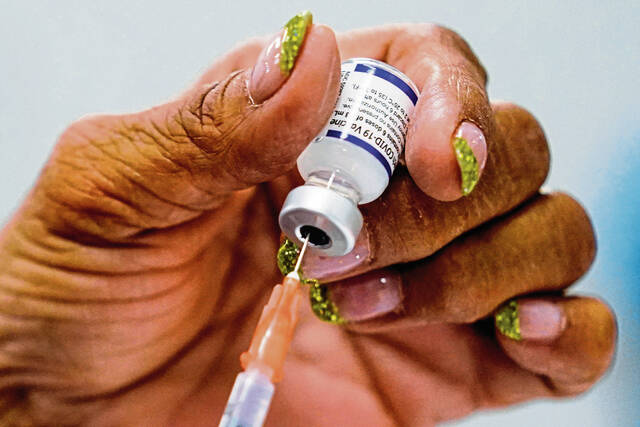Attempting to return to normal life has come with a price during the pandemic.
While many people opted to forgo large family get-togethers during the holidays last year as cases surged and the United States was still without an approved vaccine, many families seemed determined to gather this year.
Inevitably, experts say, some of those gatherings — including Christmas get-togethers this past weekend and ones around the New Year’s holiday — will lead to new covid-19 exposures and cases.
How to handle those situations will depend on a person’s vaccination status, the experts said.
“There’s a tremendous amount of disease right now, and since there’s a tremendous amount of disease, we’re seeing a lot of people exposed, whether it’s family gatherings or going out to dinner,” said Dr. John Goldman, an infectious disease expert with UPMC.
For fully vaccinated people who are exposed to covid-19 during a family gathering or other social event during the holiday season, Goldman said there is no need to call off work or change your daily routine unless you become sick — though it is wise to stay away from particularly vulnerable people for about two weeks. He suggested getting tested before seeing elderly or immunocompromised relatives and friends after an exposure.
“If you’re fully vaccinated and have a potential exposure, you can generally live your life,” he said.
“People who are fully vaccinated, particularly people who are boosted, typically just get a mild cold” if they do contract the virus, he said.
In circumstances where someone in a household has tested positive for the virus, Dr. Amy Crawford-Faucher, vice chair of Allegheny Health Network’s Primary Care Institute, said that person should isolate within the house. They shouldn’t eat meals with other family members and should use a separate bathroom, if possible, she said.
Vaccinated people living in the house should monitor for symptoms and get tested for the virus if they develop symptoms, she said.
“If I remain asymptomatic, I could probably go about my daily life carefully,” Crawford-Faucher said.
Vaccinated people who do contract the virus likely don’t spread it as much as unvaccinated individuals who get covid-19, she said.
“There is data that shows that you tend to harbor less virus, which means that you have less to spread, it’s probably harder to spread and you spread for a shorter amount of time, so the overall effect on other people is lower,” she said.
Finding tests right now is a challenge because tests are in short supply as demand surges during the holiday season, Crawford-Faucher said.
At-home rapid tests are an option, but she said they are not as accurate as PCR tests. However, she said the at-home tests are a good option for vaccinated, asymptomatic people who want to get a test before visiting elderly relatives and for unvaccinated people who are showing symptoms and are using the test to confirm their belief that they have covid-19.
She recommends a PCR test if an unvaccinated person with symptoms tests negative or if someone who is vaccinated and has no symptoms tests positive and needs a negative test to travel or go to work.
“Hopefully, we’ll have better access to rapid tests in the next month or two,” Crawford-Faucher said.
She encouraged people who have no reason to be tested to skip out on tests they might be taking if they’re “just curious,” because they’re taking hard-to-find tests from people who really need them.
It’s “unavoidable” that there will be an uptick in covid-19 cases after holiday gatherings, said Dr. Amesh Adalja, a Pittsburgh-based infectious disease expert and senior scholar at the Johns Hopkins Center for Health Security. Some of those inevitably will be breakthrough cases, he said.
“It is critical not to panic over (the) number of cases (because) these are expected to rise significantly over the next couple of weeks. (Instead, people should) focus on the severity and those cases occurring in high-risk, unvaccinated individuals that lead to hospitalization,” Adalja said.
The omicron variant, which is now likely the predominant strain, does not seem to cause “as much severe disease, especially in vaccinated people,” Crawford-Faucher said, though it is highly contagious.
She said she anticipates a potential uptick in hospitalizations in a few weeks but expects that most hospitalized patients will be unvaccinated.
While she said it is important to take precautions and stay away from gatherings while sick, she said those who are vaccinated should feel comfortable to gather.
“We’ve been dealing with this for two years now. We need our gatherings; we need our families,” Crawford-Faucher said. “We need to be as safe as we possibly can while filling that need.”








